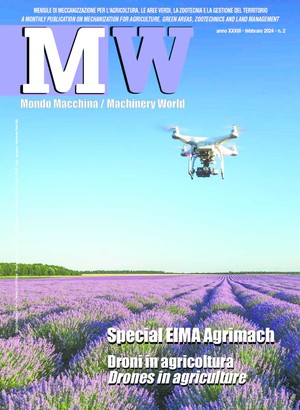
Agro-mechanics, a Made in Italy excellence
The fifth annual edition of the FederUnacoma Think Tank was held in Torgiano (Perugia). The meeting focused on the confrontation between the agricultural mechanics sector and other traditional Made in Italy areas, such as high-end automotive, fashion, and the agri-food industry. The standing of Italian agricultural technologies is excellent, nevertheless, new promotion strategies are needed to strengthen the presence of our products in foreign markets and to counter emerging competition
Although Italian agricultural mechanics quality and tradition have always been key to success in foreign markets, a further quality leap is needed. This was the message launched by the Think Tank on "Made in Italy, an added value for agro-mechanics," which took place on March 30 in the evocative location of the Castle of Rosciano (Torgiano-Perugia). "The machines manufactured by our companies must be perceived as classic "Made in Italy" products, as well as high-end automotive, fashion, and agri-food, not only in the traditional markets of Europe or the United States but" Alessandro Malavolti, president of the Federation, explained during the meeting, "also in the emerging markets of Asia, Latin America and Africa."
|
|
ICE Agency's contribution. Major support for promoting the Italian agro-mechanical sector in global markets is provided by the ICE Agency, which, claimed Agency President Matteo Zoppas, has expanded its reach with its new guidelines and its 78 offices located on every continent and organized precisely to work in close constructive interaction with producer organizations. Over the next few years," Zoppas emphasized, "the North African and Balkan regions will be some of the priority focus areas for our agricultural mechanics.
The Asia challenges. However, the data on the trend of our sector exports are comforting - in 2022, exports touched 6.5 billion euros, marking +3.6% over 2021 - however, Italian industries are facing increasingly fierce competition from emerging countries. They are mostly Asian manufacturers-Chinese, Indian, and Turkish-who mainly exploit the price lever, often offering inexpensive machinery on the market but with a lower level of quality and technology than Italian and European standards.
Changing perceptions
"In the agro-mechanical sector," it was explained during the Think Tank, "Made in Italy is not adequately perceived as an added value, unlike traditional Italian excellences." Data related to exports in the last ten years- presented by Emanuele Di Faustino, Nomisma's industry manager- show a 38 percent growth in agricultural machinery exports compared to a much greater increase in the other sectors of made in Italy (+66 percent). The promotion strategies of the Italian industry must not only enhance the perceived quality of domestic production, precisely equating it with the other excellences made in Italy but - Domino's director Dario Fabbri pointed out that they must consider all the geopolitical variables conditioning the market. From this standpoint, such strategies can leverage the increasingly central role that agricultural mechanics is being called upon to play at a time in history when agriculture has become a leading sector for all major economic systems.
National policies
Against this backdrop, the government's action - recalled by the Minister of Industry and Made in Italy, Adolfo Urso - has developed, reaffirming the urgency of supporting Italian industries' technological innovation to face competition from emerging countries. To this end, the executive is committed to streamlining and simplifying the public incentive system, which, Urso explained, must include lean procedures with easy access for businesses in order to be even more effective.
The Think Tank thematic tables
The work of the Think Tank ended with the contributions proposed by the three thematic breakout tables. The first - deals with "The Value of Made in Italy in Agribusiness Marketing. The knowledge and evaluation of the Italian product on domestic and foreign markets," coordinated by Sabina Addamiano, professor of Specialized Marketing at Roma Tre University, pointed out the need to use storytelling linked to the specific nature of territories, their history and cultural landscape. As a matter of fact, territories have given rise to specialized districts and, therefore, to a strong supply differentiation that characterizes the breadth of the range of Italian production. The table called "Global quality, a challenge for Italian industry. Design, reliability and services: The required standards in the main markets," coordinated by Roberta Guglielmetti, professor of Operation Management at Roma Tre University, highlighted how the issue of quality must be approached in a holistic and multidimensional way. In other words, this approach must not be limited to the product itself but include all those aspects related to it, starting - for example - with after-sales services and assistance limited to the product itself. To become even more competitive, the Italian industry must focus on innovative promotional strategies and a global quality concept and enhance its productions' sustainability. This was the theme covered by the Think Tank's third thematic table, "Social and environmental sustainability, a requirement of Italian quality. Human and natural resources in product enhancement." The proceedings, coordinated by Luca Ferrucci, professor of Business Economics and Management at the University of Perugia, focused on the need for Italian manufacturers to identify the macro-factors driving the growth in demand for agricultural machinery: The growing demand for arable land, the demand for second-hand replacement, and the demand for machinery to increase the quality of agricultural production.








